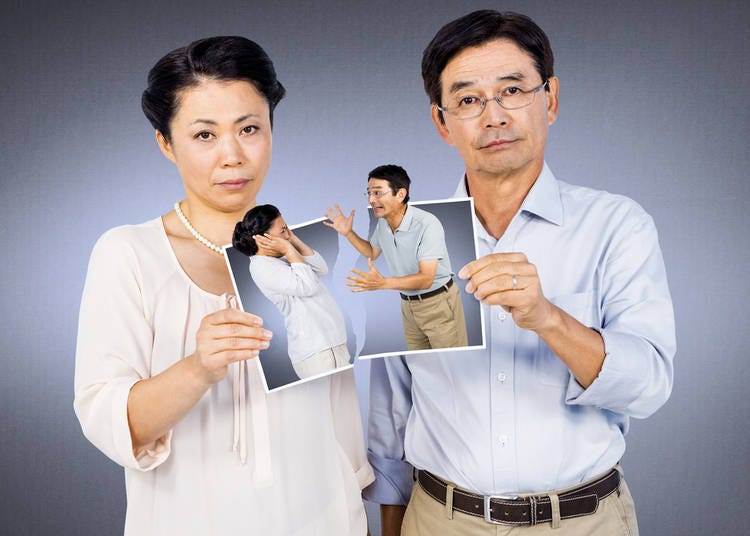I Wont Ever Let You Go Again in Japanese

How To Get Mad in Japanese: 30 Aroused Japanese Phrases for When Y'all Merely Can't Have it!
Date published: 6 December 2019
Last updated: 29 September 2020
Japanese people are often described as very polite and reserved. In fact, many of them don't show an expressive personality in public and rather keep their feelings inside than spitting it all out.
Just that doesn't mean there are no words to express your emotions!
In this article, nosotros'll have a wait at rude Japanese phrases for those times you just want to tell someone off.
- Tabular array of Contents
-
- How older people get mad in Japanese
- How adults go angry in Japanese
- Angry Japanese phrases younger people/teenager tend to use
- Petulant or angry phrases Japanese kids apply
- ...And the most powerful Japanese expression of all!
How older people get mad in Japanese

1. "Hara ga tatsu."= I'm irritated. / I'grand aroused.
This is one of the about common phrases that is used to describe general anger. It can range from being irritated to admittedly pissed off depending on how you lot say it.
・Example: Ughh, hara ga tatsu! He's parking the car in front of our place over again!
2. "Ikari shinto ni hassuru."/"Ikari shinto."= I am completely mad.
"Ikari shinto ni hasshita." = I was completely mad.
This phrase is kind of an idiom. Although it ways you are unbelievably angry, information technology is not unremarkably used at the time when you exploded merely used when you lot depict how upset you were.
・Example: And so, she snorted at me! At that time, ikarhi shinto ni hasshita.
3. "Atama ni kuru." = I'm losing my temper.
"Atama ni kita." = I lost my temper.
This phrase is used when you express your anger to yourself or somebody else who is non the 1 who provoked you.
・Example: Ahhh, atama ni kuru. My colleague simply left his job on my desk and has gone home while I was in a meeting. He e'er does this.
These three phrases above all incorporate the words of trunk parts such as 'hara' (stomach), 'shinto' (heart), and 'atama' (head). In fact, Japanese idioms often apply a part of the body.
4. "Ii kagen ni shiro!" (Male person phrase) = Give me a interruption! / That is enough (so cease it)!
"Ii kagen ni shite!" (Female phrase) = Requite me a break, please! / That is enough (so delight end it)!
・Example: Two kagen ni shiro! Information technology'southward already afterwards the mid-night, kids! Shut upwards and go to bed!
v. "Yamero!" (Male phrase) = Finish it!
"Yamete!" (Female phrase) = Stop information technology, please!
"Oyame nasai!" (Very formal, polite phrase but also implies an gild) = Would you stop it, darling, right now.
"Yame nasai!" (Less formal, but however polite, likewise implies an order. Usually used when a speaker is in a higher position than the 1 who is told. For example, a dominate to an employee, a parent to their kid, or an owner to their pet) = End information technology!
・Instance: Yamete! I said I don't desire to listen to a ghost story! Don't yous cartel start.
*Don't stop in Japanese would be "Yamenaide."
half dozen. "Omae no sei daro!" (Male person phrase) = Information technology is your fault! = Information technology must be your fault!
"Anata no sei desho!" (Female phrase) = Information technology is your fault! = It is your fault, isn't it?
In current Japan, 'omae' is a very rude way to telephone call somebody, then many Japanese get a like impression as when English language speakers are chosen like 'oi, y'all!' Whereas 'anata' is a very formal and polite word which also ways 'you', that would exist 'sir/madam', or 'darling' when information technology's said with a friendly tone, in English.
There is as well some other difference between these two phrases if you lot see the end of each phrase. 'Daro' here is quite judging while 'desho' here is more like asking. This gap makes the actual meanings of these phrases significantly different even though their definitions seem the aforementioned.
In Japanese, it used to exist believed that women must utilise 'female person language' which always contains the meaning of 'please'. As you see in the phrases shown to a higher place, they by and large share the words except for the very terminal sound of the sentences. In many cases, 'te' at the end of a sentence makes it into a more pleading phrase.
Many older ladies still speak this different language, while younger ones tend not to follow this onetime chapeau lingo.
7. "Mattaku." = Damn it. / Oh well. / etc.
This phrase shows a slight irritation, especially when you give up fighting confronting something that annoys you.
・Case: Mattaku... How many times should I tell my colleague that she'south taking the incorrect process? I'chiliad fed up with covering her...
8. "Baka baka shii." = Nonsense. / Bollocks. / Stupid. / etc.
This phrase shows irritation and a slight contempt.
・Example: Baka baka shii. What kind of myth does that politician believe? All he speaks is nonsense.
How adults get angry in Japanese

9. "Chikusho!" = Damn! / Damn it!
This phrase comes from Buddhism. Chikusho ways animals, sometimes specifically domestic animals, or brute/brute. In Buddhism, the animal doesn't include human-beings, and information technology is believed that information technology states inferiority to humans. Stemming from this, the Japanese used to call a person who does what is not adequate every bit a human 'chikusho'.
Different the English word "damn!", this Japanese word is not and so commonly used by younger people today as it sounds a bit too dramatic to say in the real globe. Withal, some older ones still say information technology when they are irritated.
・Example: Chikusho! We were ripped off!
10. "Huzakeruna." = Stop fooling around. / Come on. / What the hell? / etc.
"Huzakenaide." (Female phrase. Well-nigh the same pregnant merely this i has a pleading tone.)
The literal meaning of this phrase is 'stop fooling around.' Merely it can also describe your irritation or unpleasant surprise such as 'come up on!' or 'what the hell?'
Once again, at that place is a female version. In younger generations, women generally don't speak the female linguistic communication as much as older people practice, but some specific phrases are nevertheless used.
・Case: Huzakeruna! Y'all said everything on the menu was 500 yen! I'thousand not gonna pay ten,000 yen just for three glasses of beer and sashimi. This is a scam!
・Example 2: Huzakenaide! You must've been told we'd charge you for service and the venue fee. This is not a scam!
eleven. "Kanben shite." "Kanben shitekure." = For goodness' sake!
This phrase does non always illustrate anger as it originally means 'Delight, stop it now for me. I've had/done/tried enough.' And then, you might hear it at a market, for example, a friendly seller might say it to a client who is haggling too much.
・Example: Kanben shitekure. We've waited for 2 hours, and you say we were in the wrong queue? Take mercy, please!
12. "Iraira suru." "Iratsuku."= I'1000 irritated.
'Iraira' describes the statement of beingness irritated. And then, you can likewise use this phrase similar 'iraira shiteru ne.' = You are irritated (aren't you)? when you lot worry about somebody who seems quite upset.
・Example:Ughh, iraira suru! The machine before usa is too slow!
thirteen. "Nametenja ne zo." "Namen na./Nameru na."= Don't mess with me. / Don't take me for granted.
This phrase is to apply when y'all are treated badly. It may scare people depending on the tone of voice, so you lot should exist conscientious when using information technology.
Withal, the literal meaning of 'nameru na' is 'don't lick.' Then, you may also hear, for example, a parent says to their kid 'Nameru na.' or 'Namenai de.'(softer version) to end them licking something dirty, for example.
・Case: Y'all think I tin exercise nothing? Namen na. You'll see.
14. "Yurusanai." = I'k non gonna forgive (you/her/ him/etc.).
"Yurusenai." = I can't forgive (you/her/him/etc.).
・Example: She cheated on me. Yurusenai!
fifteen. "Nandayo!" = Bloody hell!
sixteen. "Damare." = Shut upward.
17. "Kiero." = Piss off.
18. "Kuso!" = Sh*t! / F*ck!
・Instance:
A: Nandayo! Y'all pushed me beginning!
B: Damare. It was an accident, simply then you kicked me on purpose. I tin call the constabulary if you like.
A: Kuso! You'll regret this!
B: Kiero.
19. "Oi! "= Oi!
It's pronounced almost the aforementioned as the English language version, only if the Japanese cry out "oi!", it means he/she is furious. (Or, in some cases, they are not angry just just extremely rude.)
・Example: Oi! Are you listening to me? I said you scratched my car!
twenty. "Hai hai." = Yes, yeah. / Okay, okay.
In Nippon, proverb yes twice is often considered rude behavior. In fact, many parents tell their kids off for information technology. So, when the Japanese cartel speaks like this, it 99% surely means that they are quite bellyaching and want to let another person realize it, or might be even trying to provoke them. Imagine how you'd feel if somebody says "I know, I know." before you finish. It is a similar situation to how the Japanese feel when somebody says "Hai hai."
・Example:
A: Are you listening to me? I'thousand saying I asked you ii hours ago to do the dishes, and you are still sitting on a sofa, watching the DVD! How dare you!
B: Hai hai. By the way, exercise y'all know who'due south doing all the housework every day?
Aroused Japanese phrases younger people/teenager tend to use

Younger Japanese are often called "satori generation" (Satori=Enlightenment), which ways they are realistic, likely to aim at only an attainable goal, and having lilliputian eagerness. Information technology as well caused them to be hesitant or even tend to avoid clashing with others. Hence, the angry words they utilize are ofttimes less ambitious compared to the other generations.
Too, as many of them are aware of unfairness betwixt male person linguistic communication and female person language, they tend not to use it themselves, and not to expect others to use it too.
21. "Mukatsuku." = I'grand aroused. / I don't similar information technology. / etc.
Mukatsuku originally indicates the status of your abdomen being funny similar later on you lot overate oily food. So, you tin as well use this phrase when you experience a bit sick to your tum, 'I ga mukatsuku.' (i = stomach)
And, because when it can also happen when you are upset, this phrase is used to express anger as well.
・Instance: Mukatsuku! He saw me tripped, and laughed!
22. "Uzai" = It's abrasive. / I'm bellyaching.
This is kind of slang, which the original word was "Uzattai."
Uzai, uzattai both are used when something (often persistently) annoys y'all.
・Example: Ahhh, uzai! Cease following me. I said I wouldn't become out with you lot!
23. "Doh demo 2." = Whatever. / I don't care.
24. "Suki ni sure ba?" = Why don't you behave as yous like?
25. "Moh ii." = I had enough. / I don't wait anything from you anymore.
These phrases show that a speaker no longer has whatsoever interest in others considering they are offended/angry/fed up/ etc. In Nihon, many people think indifference is worth than detest. Hence, you might be in a serious situation when you hear these phrases.
26. "Ha?" = What the hell?
This sounds often indicates a slight irritation or unpleasant surprise. (And some younger people also utilise it when they are overwhelmed because something too practiced happens.)
Unlike the English language phrase 'what the hell?' or whatsoever related variation, this is often considered as a rude, cheeky phrase by older people. Hence, I recommend you lot to consider it well earlier you endeavor the give-and-take.
27. "Shine." = Die.
Younger people ofttimes employ this word as a similar nuance of 'f*ck!' in English language, to bear witness their acrimony/irritation. So, although the literal pregnant of this phrase is 'dice' or 'you die', it tin exist said to objects besides.
Notation: As you come across its significant, this is non a very expert discussion. I suggest, if you lot feel similar to try it, to just use it inside friends or family unit, and not to humans/animals.
・Example: And so, hither's however another error! You, useless computer, shine!
Petulant or angry phrases Japanese kids use

28. "Moh!" = Ughh!
This shows a frustrating feeling when a thing doesn't go equally you await. Grown-ups too use information technology when they are lone or with their friends/family.
・Case 1: Child: Moh! My sis broke my sandcastle!
・Example 2: Developed: Moh! This laptop has a mind of its own!
29. "Ya!" "Yada!" = No! / I don't want (to do) it! / I hate information technology! / etc.
Kids use these phrases when they don't like/like to practice something, for instance, when they are forced to eat what they dislike or when they are told to put toys abroad. 'Yada' can likewise be used by adults.
・Case 1: Child: Ya! I don't become dwelling house however! I wanna play more!
・Case ii: Kid: Yada! Yada! Yada! I hate carrot! I don't wanna eat information technology!
・Example 3: Developed: What? Yada. I'm not gonna fetch a beer for yous, dad. I'm watching Television.
...And the most powerful Japanese expression of all!

Now you know 29 typical expressions of anger in Japanese! You'll definitely hear them on Television, or y'all might even have a hazard to catch some in public during your stay.
And, here is the most common one beyond all generations, that is to say, 'silence.'
After all, most Japanese people remain quiet when they are completely furious, letting the absence of sound speak louder than whatever shout could. It might be because they lose for words when they are agitated equally they are not used to expressing their feelings but to belongings information technology. Or, it might be because they feel it's embarrassing to spit out how they're offended by others. (You might take an experience where a Japanese person asked, 'Are you aroused?' when you were just tranquility. Well, this is the reason why they asked.)
Written by:

*This information is from the time of this article's publication.
*Prices and options mentioned are subject to change.
*Unless stated otherwise, all prices include taxation.
-

2022 Ramen Trends in Japan - According to a Ramen Master
-

Shinagawa Aquarium: All Yous Demand to Know for a Fun Tokyo Trip (Recommendations & Photo Spots)
-

Stay in Luxury Correct past Tokyo - iv All-Inclusive Hotel Plans in the Kanto Region!
-

Premium Chocolate Brand Lindt Nihon Launches World's Showtime Sakura LINDOR In Fourth dimension For Leap 2022!
- #all-time sushi japan
- #what to practice in odaiba
- #what to bring to japan
- #new years in tokyo
- #all-time ramen nihon
- #what to buy in ameyoko
- #japanese nail trends
- #things to do japan
- #onsen tattoo friendly tokyo
- #daiso
- #best coffee japan
- #best japanese soft drinks
- #best yakiniku japan
- #japanese fashion civilization
- #japanese convenience store snacks
Source: https://livejapan.com/en/article-a0003527/
0 Response to "I Wont Ever Let You Go Again in Japanese"
Post a Comment